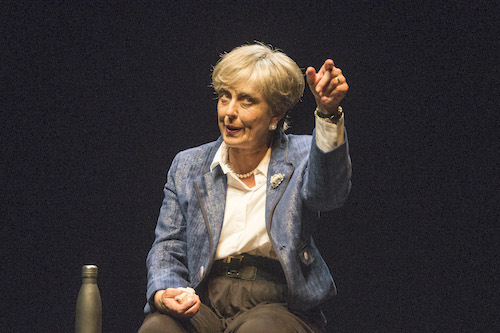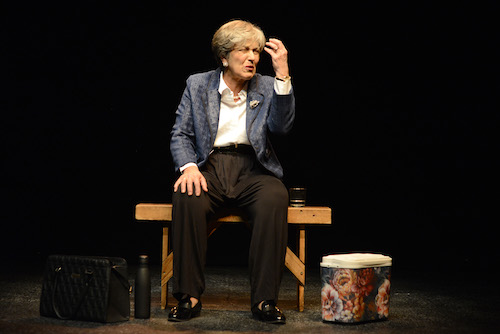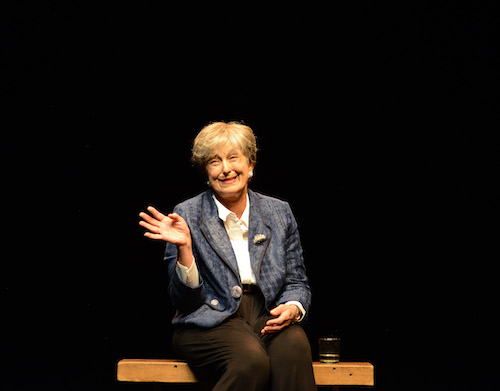 An elderly woman sits alone on a bench, with a handbag and a box of medicines at hand to treat the ailments of old age.
An elderly woman sits alone on a bench, with a handbag and a box of medicines at hand to treat the ailments of old age.
The light illuminates her, and her first few sentences stop us dead, just as a bullet stopped the young girl she’s describing. We’re already hooked by the story of Rose, a play by Martin Sherman that’s been revived by the Market Theatre in Joburg.
This is storytelling at its purest, just a voice, some gestures and a lifetime of memories, and it’s perfect for these Covid days when theatres can’t afford a large cast and fancy sets.
Camilla Waldman is magnificent as Rose, a Jew who doesn’t believe in God – and why would she, after all the horrors she’s lived through. Waldman mesmerises us as she weaves her story, never leaving her bench but her words, expressions and arms spinning out stories that ravel us into her world.
 Director Malcolm Purkey makes sure the mood is in constant ebb and flow to hold our attention. Sometimes Rose is playful and sparky, waving her hands exuberantly and laughing heartily. In the sombre moments, a downward flicker of the eyes and a droop of her mouth makes our hearts heavy.
Director Malcolm Purkey makes sure the mood is in constant ebb and flow to hold our attention. Sometimes Rose is playful and sparky, waving her hands exuberantly and laughing heartily. In the sombre moments, a downward flicker of the eyes and a droop of her mouth makes our hearts heavy.
The brilliantly written script sweeps across the years and gives us the broad Jewish history through the eyes of one woman. This is the story of an entire nation, with her description of the Nazi invasion of Poland and living conditions in the ghettos being vividly recreated in our collective minds.
What’s a little disconcerting, until it becomes gleefully liberating, is watching this 80-year-old character speak so joyously about sex. The noisy, messy, glorious delight of it with her first husband, then the disappointingly clumsy, inept attempts by her second, which saw her trying to invoke the spirit of her long-lost first husband to revive the thrills. A far younger hippy lover adds to the spice that keeps the memories of this feisty character so entertaining. Her outfit by Margo Snoyman conjures up old woman neat without restricting her exuberant movements.
 Initially the second half of the play is inevitably funnier, once Rose has fled the deprivations of life in the Ukraine and escaped the horrors of the Warsaw ghettos. But it also begins to feel a little too long for an audience out of the habit of listening and paying rapt attention for two hours and fifteen minutes.
Initially the second half of the play is inevitably funnier, once Rose has fled the deprivations of life in the Ukraine and escaped the horrors of the Warsaw ghettos. But it also begins to feel a little too long for an audience out of the habit of listening and paying rapt attention for two hours and fifteen minutes.
In an interview with the UK’s Theatre Weekly, playwright Martin Sherman said he wrote Rose when the millennium was approaching and he wanted to capture the Jewish experience of the last century, but to do so through the eyes of one character rather than create an epic.
“No one wants to write a disposable play,” he said, but he was saddened that years later the issues of war and refugees still remain a humanitarian problem that many countries refuse to deal with.
The final part sees Rose reflect on Israel and its West Bank policy, arguing with a son who left America for the promised land. That’s another issue no nearer solution than it was in Rose’s day, as Sherman reflected in Theatre Weekly. “It would be wonderful if the social and political problems surrounding Rose were solved and settled thus forcing the play to be obsolete; but contemporary events unfortunately insist on keeping the play as timely as ever,” he said.
Rose works fabulously well in South Africa, a country well used to racism, xenophobia and migration, and it made me think what a compelling new piece of theatre could be created if it inspired someone to tell a one-woman story from our townships.
Rose runs at the Market Theatre at 7pm from Tuesdays to Saturdays and 3.15pm on Sundays until May 16. Tickets from Webtickets. Photos: Suzy Bernstein.